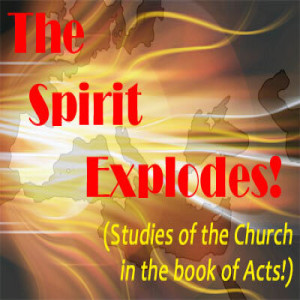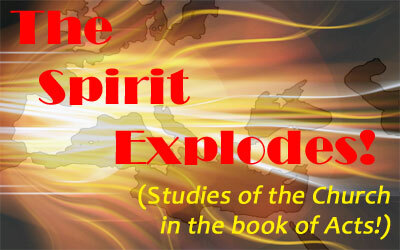
431.8K
Downloads
3368
Episodes
G’day and welcome to Partakers Christian Podcasts! Join us for uplifting Bible teaching, inspiring readings, heartfelt worship, powerful prayers, and fascinating church history. Whether you’re new to faith or growing deeper in your journey, we’re here to encourage and equip you. 🎧 Tune in, interact, and be inspired—wherever you are in the world.
Episodes

Wednesday May 29, 2024
Partakers Bible Thought – The Spirit Explodes 07
Wednesday May 29, 2024
Wednesday May 29, 2024

The Spirit Explodes
Part 7 of 22 - The Martyrdom of Stephen
(Acts 6:1 – 8:3)
Luke, probably guided by Paul’s memories of what happened, sees the teaching and death of Stephen as a major turning point in the progress of the Gospel. To this point opposition has come from the ruling classes in Jerusalem; the common people had approved of what was happening. From here on the believers lost the support of everybody. Consequently the focus of the Gospel is about to move outside Jerusalem.
First: the background in Acts6:1–7.
The “Grecian Jews” of the NIV probably means Greek speaking Jews who had retired to Jerusalem mainly in order to die there; “Hebraic Jews” probably means long term Aramaic speaking residents of the city. Each would have worshipped in a synagogue where their most familiar language was spoken. When some of each became Christian tensions arose.
The seven chosen men are often called deacons but only because the Greek word for “waiting on tables” is diakonia. Their responsibilities do not match those described in the later NT letters. However we can learn useful lessons from them.
Question 1: What were the criteria for choosing the seven? Can we relate these to our situation? All seven names are Greek. What does that tell us about the principles used in the fellowship?
They were chosen purely on the basis of their spiritual depth. I don’t know what happens where you are but all too often men and women are chosen for positions in the church on the basis of their practical qualifications. Their spirituality is the least of the attributes considered. That all of them were Greek speaking suggests that great care was taken to resolve the problems as quickly as possible.
In Acts 6:8 – 7:1, which outline the nature of the problem, Stephen faced.
The troubles started in one particularly radical synagogue, the Synagogue of the Freedmen. This included some from Cilicia, which is where Paul came from so he was probably a member of this meeting.
Now we come to the long speech of Stephen, the longest in the book of Acts. It is not at all easy to see how what he said related to the charges against him, and what upset them so much and caused him to be lynched, so I will interrupt my wife’s reading of the speech as we go along to try and explain it.
Stephen starts his speech by referring back to God’s promise to Abraham. What he says is standard Jewish thinking and quite unobjectionable, but he is starting to emphasise the way that Abraham had no firm roots in any place.
Read Acts 7:2 – 8.
Isaac and Jacob were uninteresting to Stephen because they had secure roots in Israel.
So he moves on to Joseph who did not have secure roots. He also points out that Joseph was rejected by those who should have supported him, his brothers.
Read Acts 7:9 – 19.
Next comes Moses, again a wanderer on the face of the earth, as Stephen is careful to emphasise. He also emphasises that Moses too suffered rejection by his own people on more than one occasion.
Read Acts7:20 – 43.
He continues to trace the history of his people beginning to emphasise the tabernacle as the place where God dwelt. Although David enjoyed God’s favour he did not get building the temple.
Read Acts 7:44 – 47.
He has now set the scene for what he wants to say. He has also by his strong emphasis on Moses effectively rebutted the charge that Jesus was going to change the customs of the law. Remembering how the apostles had been treated by these people he probably had decided he was likely to die anyway and he was not going to do so without making his points. So he continues by making two points:
1) the temple was not as important as they thought it was as all these great men had lived without it, being prepared to meet and worship God anywhere they happened to be. Even if Jesus had said he would destroy the temple (as he hadn’t) it would not have mattered;
2) many of these true prophets of old had been rejected by the people, as Jesus was. They, his hearers, had acted wrongly, but that was nothing new.
Read Acts 7:48 – 53.
He was not exactly diplomatic in the way he put it! The reaction was overwhelming. The veiled argument behind the history is that God is not limited to any one place, in particular the temple. He is therefore not under the control of the Sanhedrin. Their power is finished. The true next step in the purposes of God is with Jesus and his people.
Read Acts 7:54 – 8: 1a.
Question 2: What are the practical implications today of there being no particular place where the Lord is to be worshipped? In what ways do people wrongly contradict that fact?
Cathedrals, and the like, can be wonderful places but they don’t really fit into the scene Stephen paints. The idea that the temple in Jerusalem should be rebuilt, as advocated by some people, also falls before Stephen’s argument. It doesn’t matter where we gather and worship. The important things are gathering and worshiping.
Question 3: Stephen was obviously a vigorous personality who was not prepared to keep quiet, even if he was also full of the Holy Spirit! Such people are not always comfortable to live with. What place should such people have in the present day church?
There ought to be room for every personality type in every fellowship. It is important that the leadership of every group uses to the full the best attributes of everyone while curbing their less useful attributes, whether that be making too much noise or too little!
Probably it was when Stephen said that he saw the Son of Man standing at the right hand of God that his fate was sealed. Jesus said something similar when he said that the Son of Man would be seated at the right hand of God and that was the point at which they decided to kill him. Both were referring to Daniel 7 where one like a Son of Man approached the Ancient of Days and was given authority, glory and sovereign power.
Question 4: Why were these statements taken so amiss?
These were the clearest possible statements that Jesus was the Messiah and that he would be given the authority and power they (the members of the Sanhedrin) so much enjoyed. Beware the love of power!
Read Acts 8: 1 – 3
And so the purposes of God were fulfilled in the persecution and scattering of the church.

No comments yet. Be the first to say something!